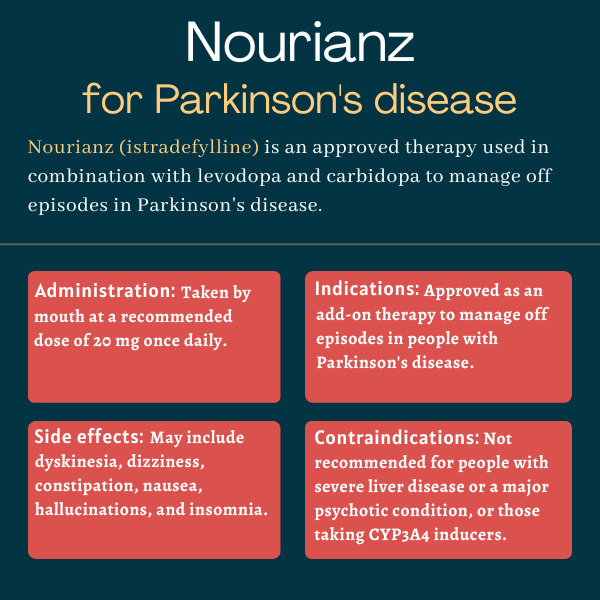Nourianz (istradefylline) for Parkinson’s disease
What is Nourianz for Parkinson’s disease?
Nourianz (istradefylline) is an approved oral therapy used in combination with levodopa and carbidopa to ease off episodes in people with Parkinson’s disease. Off episodes are periods when symptoms of Parkinson’s aren’t adequately controlled between scheduled doses of levodopa and carbidopa.
The medication is marketed in the U.S. by Kyowa Kirin Pharma. In the European Union, an application requesting its approval under the brand name Nouryant was rejected in 2021.
Therapy snapshot
| Brand name: | Nourianz |
| Chemical name: | Istradefylline |
| Usage: | Used as an add-on therapy to manage off episodes in Parkinson’s disease |
| Administration: | Oral tablets |
How does Nourianz work?
Parkinson’s is caused by the death and dysfunction of nerve cells in the brain that are responsible for making dopamine. Dopamine is a neurotransmitter — a chemical that nerve cells use to communicate with each other and the rest of the body. In Parkinson’s, reduced dopamine signaling gives rise to most disease symptoms.
Levodopa, given alongside carbidopa, is a standard treatment for Parkinson’s that essentially works by giving the brain more raw materials with which to manufacture dopamine. Specifically, levodopa can be converted into dopamine in the brain, and carbidopa helps more levodopa get into the brain.
The exact mechanism of how Nourianz works in people with Parkinson’s isn’t well understood. The medication’s active ingredient is known to block adenosine A2A receptors on brain cells, which may regulate the activity of adenosine, another neurotransmitter involved in movement.
It’s though adenosine works like pressing the brake pedal to limit movement, while dopamine is similar to the gas pedal in that it promotes movement. Adenosine becomes more active as Parkinson’s progresses, so blocking the A2A receptors may help improve movement while reducing off episodes.
Who can take Nourianz?
Nourianz was approved by the U.S. Food and Drug Administration in August 2019 as add-on treatment for adults with Parkinson’s disease experiencing off episodes while on levodopa and carbidopa therapy. This marked the first approval of an adenosine A2A receptor inhibitor for Parkinson’s in the U.S.
It was approved in Japan in 2013, where it is sold under the brand name Nouriast.
Who should not take Nourianz?
The prescribing information for Nourianz lists no contraindications. However, the medication should be avoided in people with severe liver impairment or in those with a major psychotic condition, due to its potential risk to exacerbate psychosis.
Nourianz also should not be used in combination with substances that strongly activate the liver enzyme CYP3A4 — such as carbamazepine, phenytoin, rifampicin, and St. John’s wort — which can significantly reduce the amount of medication available.
How is Nourianz administered in Parkinson’s?
Nourianz is available as peach, film-coated tablets that come in two dosage strengths:
- 20 mg, which come as pillow-shaped tablets with “20” debossed on one side
- 40 mg, available as almond-shaped tablets with “40” debossed on one side.
The recommended dosage for Nourianz is 20 mg once daily. That dose can be increased up to 40 mg per day if tolerated in instances where the lower dose isn’t adequately controlling symptoms.
However, people with moderate liver impairment, or individuals taking medications that block the activity of the CYP3A4 enzyme should not exceed 20 mg per day.
The recommended dose of Nourianz is 40 mg per day in people who smoke 20 cigarettes or more per day, or consume an equivalent amount of tobacco in another form.
Nourianz may be taken with or without food. The medication can cause insomnia, so it’s generally recommended that it be taken first thing in the morning.

Nourianz in clinical trials
The approval of Nourianz was based on data from four Phase 2 and Phase 3 clinical trials — two in North America (NCT00456586, NCT00199407) and two in Japan (NCT00455507, NCT00955526) — each lasting 12 weeks.
These studies tested Nourianz against a placebo in a total of 1,143 people with Parkinson’s who were experiencing at least two hours of off time per day, despite treatment with levodopa and other standard Parkinson’s medicines.
North American studies
Among the North American studies, one tested Nourianz at a dose of 20 mg per day at sites in the U.S. and Canada and the other tested a 40 mg dose in the U.S. In both studies, the primary goal was to measure changes in the percentage of awake time spent in off periods.
Data from these studies showed that the percent off time was reduced significantly more (6.78% more) with Nourianz than a placebo. In general, patients also spent more time with well-controlled symptoms after treatment — nearly one more hour a day in patients given the higher dose, and a bit more than 30 minutes in those given the lower dose.
Japanese studies
The Japanese studies both tested Nourianz at doses of 20 or 40 mg/day against a placebo. The treatment also outperformed a placebo at reducing off time in these studies. The 40 mg dose reduced daily off periods by 44 to 55 more minutes than a placebo, while the difference between the lower dose and the placebo was 39 to 46 minutes.
The average amount of time where symptoms were well controlled also increased by about 34 to 50 minutes per day for patients given either dose of Nourianz.
A 2020 analysis of these and other studies indicated Nourianz was effective at reducing daily off time irrespective of whether patients were experiencing dyskinesia, a common levodopa side effect marked by uncontrolled movements.
Common side effects of Nourianz
The most common side effects of Nourianz include:
- dyskinesia (uncontrolled movements)
- dizziness
- constipation
- nausea
- hallucination
- insomnia.
Dyskinesia
Dyskinesia, or abnormal, involuntary movements, is a common side effect of long-term levodopa treatment. Use of Nourianz in combination with levodopa may cause dyskinesia or worsen existing dyskinesia.
Hallucinations and psychotic behavior
Patients taking Nourianz may experience psychotic behavior such as hallucinations, when a person sees or hears something that is not there, confusion, disorientation, and aggressive behavior. If hallucinations or psychotic behaviors develop, it’s generally recommended Nourianz be stopped or the dose reduced.
Because the therapy may worsen existing psychosis, it should not be used in people with major psychotic disorders.
Impulse control and compulsive behaviors
People taking Nourianz and other Parkinson’s therapies may experience intense urges to engage in risky behaviors such as binge eating, sexual escapades, or gambling. These urges might not register as abnormal to the patient, so it’s important that clinicians and caregivers be on the lookout for signs of abnormal behaviors. If unusual problematic urges develop, the dose may be reduced or treatment may be stopped.
Use in pregnancy and breastfeeding
There are not adequate data on the use of Nourianz in people who are pregnant or breastfeeding, but data from animal studies suggest this medication can cause harm to a developing fetus if used during pregnancy, and it is excreted in milk during lactation.
Patients who are planning to become pregnant or to breastfeed should carefully weigh the benefits for the mother against the potential risks on the fetus or infant before starting Nourianz.
Parkinson’s News Today is strictly a news and information website about the disease. It does not provide medical advice, diagnosis or treatment. This content is not intended to be a substitute for professional medical advice, diagnosis, or treatment. Always seek the advice of your physician or another qualified health provider with any questions you may have regarding a medical condition. Never disregard professional medical advice or delay in seeking it because of something you have read on this website.
Recent Posts
- The frustration of feeling misunderstood due to Parkinson’s
- That moment the ball is in the air: A guide to living with uncertainty
- Vincere gets $5M MJFF grant to develop Parkinson’s treatment
- My 15-year journey as a successful Parkinson’s family caregiver
- APDA launches new awards program to sustain research
Related articles

 Fact-checked by
Fact-checked by 




